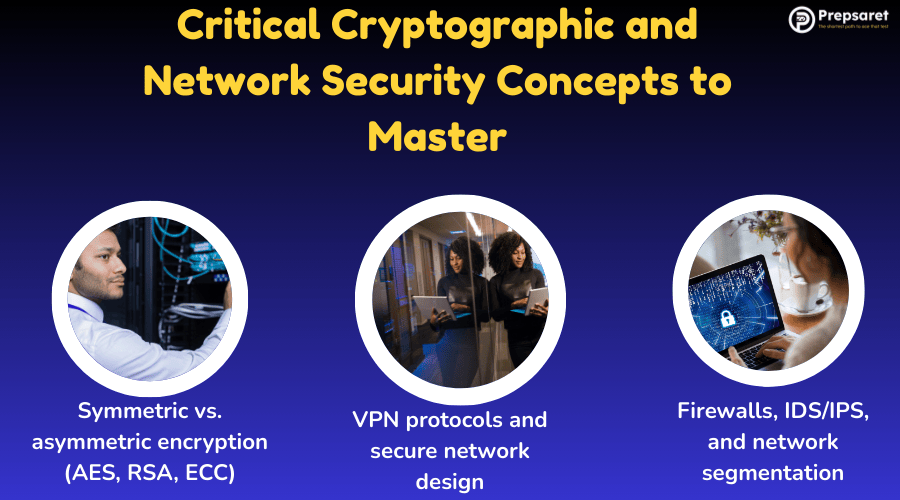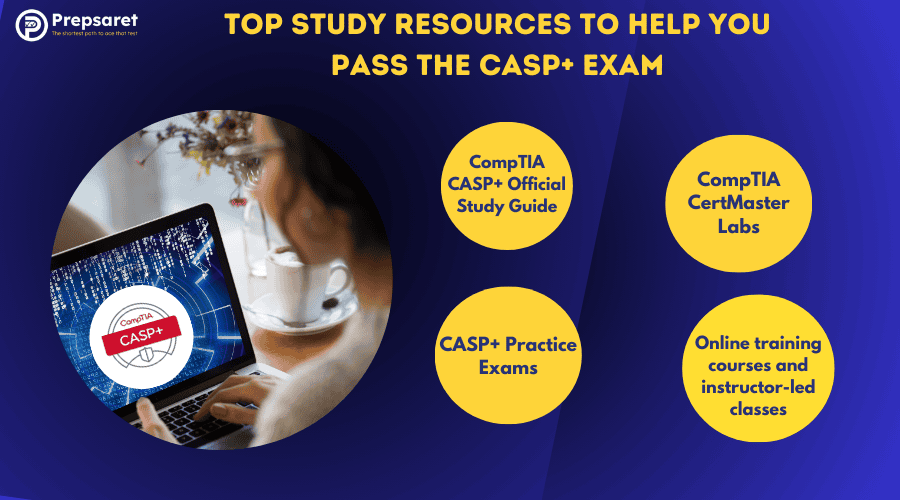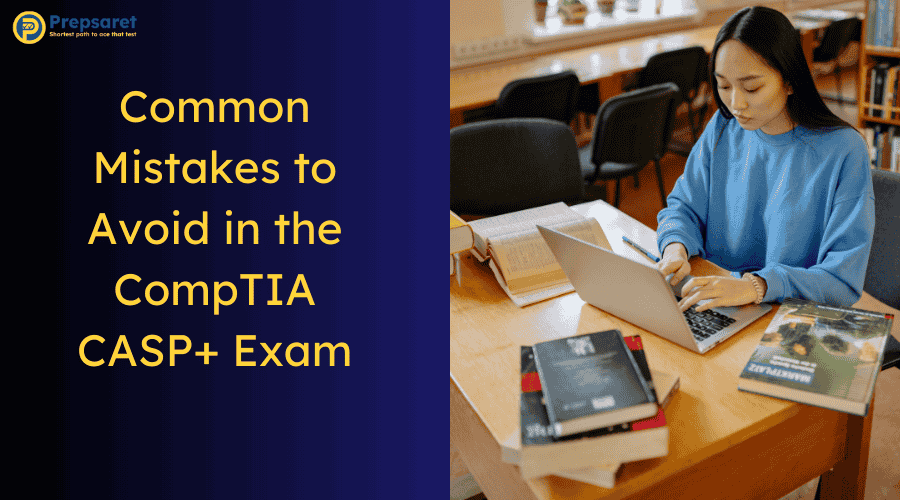Common Mistakes to Avoid in the CompTIA CASP+ Exam
The CompTIA Advanced Security Practitioner (CASP+) certification is a top-tier credential for cybersecurity professionals looking to validate their advanced skills.
Unlike entry-level certifications such as Security+ or intermediate-level ones like CySA+, CASP+ is geared toward experienced professionals who design and implement security solutions in complex enterprise environments.
The CAS-004 exam questions include both multiple-choice and performance-based questions (PBQs), making it a challenging test of both theoretical knowledge and hands-on expertise.
Many candidates struggle with time management, insufficient practical experience, and misunderstanding the exam structure. In this guide, we’ll explore the most common mistakes to avoid in the CompTIA CASP+ exam answers and how to overcome them.
Ready to ace your CASP+ exam? Start preparing today with hands-on labs and CASP+ practice tests from Prepsaret.
Understanding the CASP+ Exam Structure and Objectives
How CASP+ Differs from Other CompTIA and Cybersecurity Exams
Unlike Security+ or CySA+, the CASP+ exam is designed for experienced professionals rather than entry-level or mid-career candidates. Here’s how it stands out:
- Performance-Based Questions (PBQs): CASP+ places a heavy emphasis on hands-on skills through PBQs that require test-takers to configure systems, analyze network security issues, or troubleshoot cybersecurity threats.
- Higher Difficulty Level: While Security+ and CySA+ focus more on knowledge-based questions, CASP+ challenges candidates to apply their expertise in real-world scenarios.
- Comparison to CISSP, CEH, and Other Certifications: While CISSP is more policy- and management-focused, and CEH emphasizes ethical hacking, CASP+ bridges the gap between hands-on security and leadership-level decision-making.
Understanding these differences is key when considering how hard is CASP+ and preparing effectively for the exam.
Related blog post: CompTIA CASP+ Domains Breakdown
Neglecting Hands-On Practical Experience
Since CASP+ tests real-world problem-solving abilities, candidates who focus solely on book knowledge often struggle.
Best Practices for Gaining Hands-On Security Experience
To build the practical skills needed to pass the CASP+ exam, consider:
- Setting up a home lab with virtualization tools like VirtualBox, VMware, or Hyper-V.
- Practicing penetration testing and security analysis tools, such as:
- Wireshark (packet analysis)
- Metasploit (penetration testing)
- Nmap (network scanning)
- Participating in Capture The Flag (CTF) challenges and security boot camps to apply security concepts in real-world scenarios.
- Working with SIEM (Security Information and Event Management) platforms to analyze security events.
The more hands-on experience you gain, the better prepared you’ll be for CAS-004 exam questions and PBQs. This is one of the CompTIA CASP+ study tips that can significantly improve your chances of success.
Learn more: CompTIA CASP+ Salary Expectations
Mismanaging Time During the CASP+ Exam
Many test-takers underestimate the time constraints of the CASP+ test bank, which can lead to incomplete answers and lost points.
Time Management Tips for CASP+
Here’s how to stay on track:
- Allocate time wisely: Spend more time on PBQs but don’t let them consume your entire test duration.
- Flag difficult questions: If you get stuck, mark the question and return to it later.
- Use the process of elimination: Narrow down answer choices on multiple-choice questions to improve your odds of selecting the correct response.
- Prioritize known topics: Tackle questions you’re confident in first before moving on to more challenging ones.
Effective time management can be the difference between passing or failing the CASP+ exam. Many candidates make the CompTIA CASP+ exam mistake of spending too much time on one question and running out of time for others.
Ignoring Key Security and Risk Management Concepts
Risk management isn’t just another topic in the CASP+ exam—it’s the backbone of cybersecurity decision-making. If you don’t have a solid grasp of risk management frameworks and strategies, you might struggle with many of the scenario-based questions.
Key Risk Management Areas to Focus On
- Understanding NIST, ISO 27001, and COBIT frameworks: These frameworks guide security policies, governance, and risk assessment. Expect CASP+ exam common mistakes related to misinterpreting these concepts.
- Learning business continuity (BCP) and disaster recovery (DR) strategies: CASP+ isn’t just about securing data—it’s about keeping businesses running. Know how to develop BCP and DR plans that minimize downtime.
- Studying vendor risk management and compliance: Third-party vendors can introduce vulnerabilities. You need to understand compliance requirements and how to assess vendor security risks.
Overlooking these key concepts is one of the most common CompTIA CASP+ exam pitfalls.
How to Pass the CASP+ Exam

Many candidates wonder how to pass CASP+ on their first attempt. The key lies in thorough preparation, hands-on experience, and understanding CASP+ exam tips and tricks.
Avoiding CASP+ Exam Preparation Mistakes
- Skipping practice tests: The CASP+ test bank and CASP+ practice tests provide a realistic sense of the exam format and question types.
- Not reviewing official study materials: Use CompTIA’s official study guides and training programs.
- Failing to manage stress: Test anxiety can impact your performance. Practice relaxation techniques to stay calm during the exam.
With the right approach, you can pass the CASP+ exam and earn your certification.
Find out: How Long Does It Take to Study for CompTIA CASP+?
Understanding the CASP+ Exam Cost
Before scheduling your exam, consider the CompTIA Advanced Security Practitioner (CASP+ exam cost). The cost may vary depending on your location, but investing in a solid study plan can ensure you don’t have to pay for a retake.
By avoiding CompTIA CASP+ exam mistakes and focusing on effective study strategies, you’ll be well on your way to success.
Overlooking Cryptographic and Network Security Fundamentals
Cryptography and network security are the glue that holds modern cybersecurity together. If you ignore these topics, you’ll be in for a rough time on exam day.
One of the top reasons people fail the CASP+ exam is neglecting these foundational areas, which are critical for securing enterprise environments and answering complex exam questions effectively.
Critical Cryptographic and Network Security Concepts to Master

- Symmetric vs. asymmetric encryption (AES, RSA, ECC): Know when to use each encryption type and why they matter for data protection. Avoiding errors in the CASP+ exam starts with understanding how encryption protects sensitive data and choosing the right cryptographic method for a given scenario.
- VPN protocols and secure network design: Expect questions on IPsec, SSL/TLS, and how to implement a secure remote access solution. Misconfiguring these protocols is one of the biggest mistakes in the CASP+ exam, so make sure you know their differences and best-use cases.
- Firewalls, IDS/IPS, and network segmentation techniques: Understanding how to design and deploy these security controls is key to securing enterprise environments. A solid grasp of these concepts will help you troubleshoot and solve CASP+ exam performance-based questions effectively.
Failure to Apply Critical Thinking in Scenario-Based Questions
The CASP+ exam isn’t about memorizing facts—it’s about solving problems. Many candidates fail because they don’t approach scenario-based questions with the right mindset.
Understanding cybersecurity certification exam strategies is essential to navigating these questions with confidence.
CASP+ Test-Taking Strategies for Performance-Based Questions (PBQs)
- Carefully analyzing each scenario and identifying security threats: Read the question carefully, highlight key details, and think like an analyst. One of the common pitfalls in CASP+ certification is rushing through PBQs without fully understanding the scenario.
- Using keywords and elimination techniques to find the best solution: Many wrong answers include partial truths—narrow your options by eliminating solutions that don’t fully address the scenario. A well-planned study plan to avoid mistakes in the CASP+ exam should include practicing these techniques regularly.
- Choosing the most practical security control based on risk analysis: The best answer isn’t always the most technical one—it’s the one that best mitigates risk in a real-world environment. The CASP+ exam do’s and don’ts include prioritizing security controls based on business impact rather than technical complexity.
Skipping the Official CompTIA CASP+ Study Materials
It might be tempting to rely solely on free resources, YouTube tutorials, or random blogs. But here’s the deal—official CompTIA study materials are designed to align perfectly with the exam objectives.
If you skip them, you risk missing key concepts that could make or break your score. How to avoid failure in the CompTIA CASP+ test? Ensure you use authoritative study materials that cover all exam domains.
Top Study Resources to Help You Pass the CASP+ Exam

- CompTIA CASP+ Official Study Guide – This guide provides comprehensive coverage of every exam objective. It’s your go-to resource for structured learning.
- CompTIA CertMaster Labs – CASP+ isn’t just about theory. CertMaster Labs help you gain hands-on experience, which is crucial for performance-based questions.
- CASP+ Practice Exams – Taking high-quality practice tests helps simulate real exam conditions, making you feel more comfortable on test day.
- Online training courses and instructor-led classes – If self-study isn’t your thing, consider an instructor-led course or a structured online training program. These provide expert guidance and additional resources to reinforce learning.
Not Taking Full-Length Practice Exams and Performance-Based Questions (PBQs)
Studying is great, but if you’re not testing yourself under real exam conditions, you might be in for a surprise on exam day. Many candidates underestimate the difficulty of PBQs and the time constraints of the exam.
CASP+ troubleshooting and problem-solving skills are developed through regular practice, and skipping full-length exams is one of the top reasons people fail the CASP+ exam.
Why Full-Length Practice Exams Matter
- Simulates real CASP+ exam conditions – The CASP+ exam is a grueling 165-minute test. Practicing full-length exams helps you build the stamina needed to stay focused throughout.
- Identifies weak areas for focused study – By reviewing your practice test results, you can pinpoint your weak spots and prioritize them in your study plan to avoid mistakes in the CASP+ exam.
- Improves time management for PBQs – Performance-based questions take longer than multiple-choice questions. Regular practice helps you gauge how much time to allocate to each section.
- Builds confidence with exam-style questions – Familiarity with question formats reduces test anxiety and ensures you’re not caught off guard.
- Enhances decision-making in security scenarios – CASP+ tests your ability to analyze complex security scenarios. Practicing realistic questions improves your ability to think critically under pressure.
To successfully pass the CompTIA CASP+ exam, you must combine a strategic study plan with effective test-taking techniques.
Avoiding errors in the CASP+ exam starts with mastering cryptographic and network security fundamentals, refining your cybersecurity certification exam strategies, and learning from common pitfalls in CASP+ certification.
Follow these CASP+ test-taking strategies, use the right study resources, and practice performance-based questions diligently to increase your chances of success.
FAQs
Which is The Hardest CompTIA Exam?
CASP+ is often regarded as the hardest CompTIA exam due to its advanced-level content and focus on hands-on security implementation rather than just theoretical knowledge.
However, some professionals find the CompTIA PenTest+ difficult due to its hands-on penetration testing components.
Is CompTIA CASP Going Away?
No, CompTIA CASP+ is not going away. It continues to be updated to align with current cybersecurity industry needs. The latest version, CASP+ (CAS-004), was released in October 2021, and a new version, CASP+ (CAS-005), is expected.
How Many Questions Are On The CASP+ Exam?
The CASP+ exam consists of a maximum of 90 questions, including multiple-choice and performance-based questions. The exam lasts 165 minutes, and it is pass/fail (no scaled score is provided).

